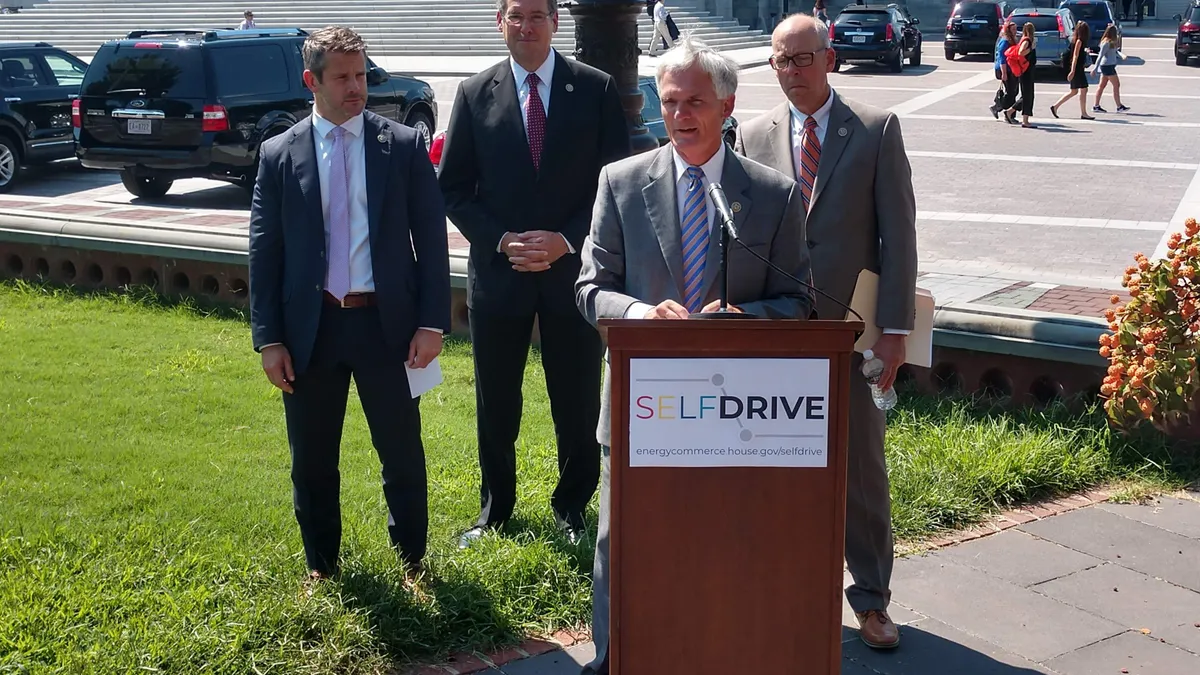Members of the U.S. House of Representatives’ Energy & Commerce Committee criticized their U.S. Senate colleagues for not acting quickly enough on federal legislation for autonomous vehicles (AVs).
At a Thursday press conference on Capitol Hill, four Republican members said the United States risks falling behind international competitors including China, Singapore and Germany if it does not get a national framework in place and allow innovation to continue to flourish.
"When you look around the world right now, you have the Chinese and other countries out there that are developing the AV technology,” Rep. Bob Latta, R-Ohio, chair of the Digital Commerce and Consumer Protection subcommittee, said at the press conference. "If we don't get started and make sure we get it done in this country, the United States is going to lose that innovation edge and we're going to see it being developed somewhere else, someplace else where you might not want to be having it developed."
The House passed the Safely Ensuring Lives Future Deployment and Research in Vehicle Evolution Act (known as the SELF DRIVE Act) by voice vote last year, having also passed the legislation unanimously out of committee shortly before.
But similar regulations have stalled in the Senate, which instead advanced its American Vision for Safer Transportation Through Advancement of Revolutionary Technologies (AV START) Act through its Commerce Committee, but has failed since to pass it on the chamber floor.
Rep. Gregg Harper says that if the US doesn't lead on AVs, others like China will. "The Senate has an opportunity to join us in history," he says.
— Chris Teale (@chris_teale) September 6, 2018
Earlier this year, multiple sources told Smart Cities Dive the bill could be attached to the reauthorization of the Federal Aviation Administration (FAA), among other options. But that effort has floundered in the face of significant opposition from some Senate Democrats, who sent a letter expressing concerns around AV safety and implementation. Earlier this year, AV START Act co-sponsor U.S. Sen. Gary Peters, D-Michigan, raised similar concerns.
And those Democrats came under fire from the House Republicans at the press conference, who told them to remove their anonymous holds from the legislation and allow it to proceed. Rep. Greg Walden, R-Oregon, who chairs the full Energy and Commerce Committee, said they “need to be called on the carpet for it.”
"They're standing in the way. That's my message,” he said. “Whoever's got holds on it, take the holds off. Come out in the sunlight, join us out here, let's talk about it. But right now, it's all delay. It's resist. That's what they're all about, they don't want to get it done, or they'd be working with us.”
Elsewhere, pressure to pass national legislation regulating AVs is intensifying, both from inside and outside Congress. This week, the House Transportation and Infrastructure Committee’s Subcommittee on Highways and Transit held a hearing entitled “Innovation in Surface Transportation,” where multiple speakers called for federal involvement and nationwide guidelines. They cited safety and consistency concerns, noting that rural areas could be left behind if there is not a national standard.
“Rural transit providers like ours need technical assistance and peer examples to embrace and implement these new technologies, while federal legislation on autonomous vehicles needs careful consideration by Congress to ensure these vehicles are accessible, safe, convenient and affordable for all Americans in communities large and small,” Julia Castillo, executive director of the Heart of Iowa Regional Transit Agency, testified before the committee.
Meanwhile, Sherif Marakby, CEO of Ford’s autonomous vehicles arm, wrote a letter to Senators urging them to take up and pass legislation on AVs. “What is still lacking is a strong federal framework that supports the near and long-term development and safe deployment of autonomous vehicles,” Marakby wrote.
At the press conference, committee members said a “patchwork” of state laws governing AVs is not good enough, and that it is time for the Senate to pass its bill so that the two pieces of legislation can be reconciled in conference.
“A car can't just shut down at a state line, for instance when it leaves Illinois and enters into Indiana, so we need a federal framework to prevent that from happening,” Rep. Adam Kinzinger, R-Illinois, said.















